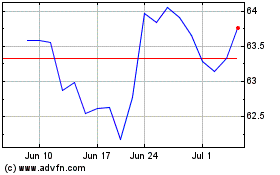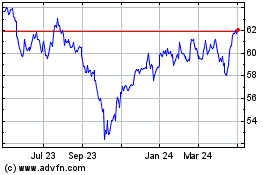Drink Makers Combat Soda Slump -- WSJ
February 12 2018 - 3:02AM
Dow Jones News
By Cara Lombardo
This article is being republished as part of our daily
reproduction of WSJ.com articles that also appeared in the U.S.
print edition of The Wall Street Journal (February 12, 2018).
Coca-Cola Co., PepsiCo Inc. and Dr Pepper Snapple Group Inc.
have been remaking themselves for the past decade, adding products
like kombucha tea and coconut water as consumers migrate to less
sugary drinks.
But the three drink giants, set to report their fourth-quarter
earnings this week, have recently embraced different strategies to
combat the long slide in soda sales.
PepsiCo said Thursday it is launching a colorful seltzer water
brand called Bubly, making it the latest drink company to go after
a larger piece of the flavored sparkling water market. The market
grew by more than 15% last year to $2.4 billion, according to
research firm Euromonitor International, led by National Beverage
Corp.'s La Croix.
PepsiCo will need Bubly and more to reinvigorate its North
American beverage unit, its largest, whose profit dropped 10% last
quarter. The company blamed disappointing results on cooler summer
weather and too much marketing focus on healthier brands. Analysts
polled by Thomson Reuters expect the segment to report
fourth-quarter revenue of $5.9 billion, down from $6.3 billion a
year ago.
To offset the drop, PepsiCo has leaned on its snack business,
which includes brands such as Doritos and Sun Chips, and a
companywide cost-cutting initiative that has yielded annual savings
of around $1 billion. But analysts worry the Purchase, N.Y.-company
is making things worse for itself by not keeping drink prices in
line with those of competitors.
Dr Pepper, the smallest of the three drink rivals, revealed
plans last month to merge with Keurig Green Mountain, a company
best known for its single-serve coffee pods, in a $19 billion
tie-up that has industry-watchers both stumped and intrigued.
Executives from the two companies say the deal will allow Keurig
and its owner, the European investment firm JAB, to add their
coffees to Dr Pepper's distribution network and strengthen Dr
Pepper's e-commerce capabilities.
While it could give Keurig's sales a needed boost, implications
are less clear for Dr Pepper's faltering soda business, which
includes brands like A&W Root Beer and 7UP. When Dr Pepper
reports earnings Wednesday, its investors will want to know what to
expect, beyond a $103.75 per share special cash dividend.
"I'm not sure anything they say will matter for the stock, given
the M&A, " Bernstein analyst Ali Dibadj said. "But I think we'd
like to see if there's any sign explaining why this sudden
sale."
Coca-Cola is betting four new flavors of Diet Coke in sleeker
cans with names like "Zesty Blood Orange" will help it hold on to
soda drinkers a little longer.
The Atlanta-based company's Diet Coke sales have dropped every
year since 2006, though Coca-Cola managed to keep its soda volumes
flat last quarter. The results were helped by Coca-Cola Zero Sugar,
which like Diet Coke is artificially sweetened and
calorie-free.
While Diet Coke is still the third-largest carbonated soft drink
brand in the country, according to industry publication
Beverage-Digest, the new flavors are competing with a
larger-than-ever bevy of alternatives including fizzy waters and
other flavored no-calorie and low-calorie drinks.
The new drinks hit shelves after the fourth-quarter ended, but
Coca-Cola might hint at early results when it reports earnings
Friday. Investors will also want to see how much refranchising
bottling operations boosted the company's operating profit margin
last quarter.
Write to Cara Lombardo at cara.lombardo@wsj.com
(END) Dow Jones Newswires
February 12, 2018 02:47 ET (07:47 GMT)
Copyright (c) 2018 Dow Jones & Company, Inc.
Coca Cola (NYSE:KO)
Historical Stock Chart
From Mar 2024 to Apr 2024

Coca Cola (NYSE:KO)
Historical Stock Chart
From Apr 2023 to Apr 2024
